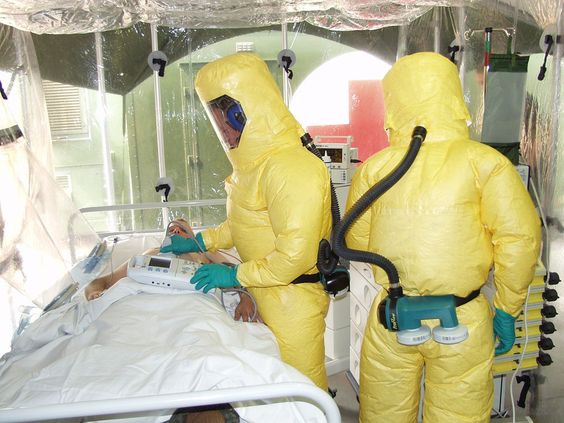The Inaugural Infectious Disease Virtual Event

The Inaugural Infectious Disease Virtual Event
On April 25, 2019, we launched our first Infectious Disease Virtual Event, and due to such a positive response, we hope to follow up with an even larger event in 2020. This year we focused on current challenges and emerging technologies in infectious disease research. In addition, we looked at past lessons learned in treating and managing tuberculosis and predicting the next pandemic.“I think this is great to be able to attend this in the virtual world!” ---Rachel H.
Colleen Kraft, MD, MSc, Associate Professor of Pathology and Laboratory Medicine at Emory University School of Medicine, opened the event with her keynote presentation, Ebola Virus Disease-2019 and Beyond. Dr. Kraft was involved in the care of patients with Ebola virus, who were repatriated to other countries, and Lassa Fever at Emory University Hospital between 2014-2016. She is also a co-principal investigator for the National Ebola Training and Education Center, which is a federally funded collaboration between Emory, Nebraska Medicine, New York Health, and Hospital-Bellevue. In her presentation, Dr. Kraft discusses the first RCT that came out of the 2014-2016 outbreak regarding therapies for Ebola. That study was significant in that our knowledge (clinical, epidemiological, and scientific) increased dramatically during the outbreak.
Ebola Patient in Isolation
Stephen Morse, Ph.D., FAAM, FACE, is the Professor of Epidemiology and Director of the Infectious Disease Epidemiology Certificate Program at the Columbia University Mailman School of Public Health. He followed Dr. Kraft with his keynote presentation, The Next Pandemic, where he describes the difference between an emerging disease and a pandemic. Many emerging diseases are zoonoses, such as avian influenza and Middle East Respiratory Syndrome (MERS). Pandemics come from epidemics that have spread over a broader geographic range. Unfortunately, to date, we have not correctly predicted any pandemics, and our responses have been reactive rather than proactive. Dr. Morse goes on to discuss the risks of future pandemics and prevention strategies.“The best ever comment from Dr. Morse’s keynote presentation. It’s not just how did the chicken cross the road, but how did the chicken’s viruses?!” –Janine M.
Matthew Flegal, BS, SRS, the Senior Associate Scientist of Behavioral Pharmacology and Surgery at Biogen, discusses in his presentation, In Vivo Models for Infectious Disease Research Through the Years, lessons learned in the past about advances made in infectious disease research. He points out that old core technologies are still an essential part of in vivo infectious disease research along with innovations and that we must continue to maintain humane treatment of animals used in experiments.“Thank you for the speakers and sponsors. It is very helpful and educational. I love attending these webinars and virtual events.” --Vina P.
An introduction to current challenges and controversies in infectious disease research was addressed in two presentations: Faramarz Valafar, PhD, Director and Professor of the Biomedical Informatics Research Center Laboratory for Pathogenesis of Clinical Drug Resistance and Persistence at San Diego State University, introduces in his presentation, Diagnosis and Treatment of Tuberculosis, a Case Study in Challenges and Threats Posed by Infectious Diseases, current epidemiology, diagnostic platforms, and antibiotic resistance issues in the management and prevention of Mycobacterium tuberculosis infections. Meredith Ashby, Ph.D., who is the Director of Market Strategy for Microbial and Cancer Genomics at Pacific Biosciences, offers unique insight into understanding methods in genomic sequencing of pathogens using long-read sequencing. In her presentation, Long-Read Sequencing and Infectious Disease: New Insights Into Longstanding Challenges, Dr. Ashby describes how these methods are elucidating ways that pathogens adapt to evolutionary changes as well as immune responses with the invasion of parasites. Krishnan Allampallam, Ph.D. and Paul Lambotte, Ph.D. examine emerging tools and methods in their presentation, Advances in Point-Of-Care Testing for Infectious Diseases. Dr. Allampallam is the Global Marketing Director for ChemBio Diagnostic Systems, Dr. Lambotte is the Vice President of Research and Development at ChemBio Diagnostic Systems. Together, they explore rapid point-of-care (POC) testing and current developments and needs in infectious disease testing. ChemBio Diagnostic Systems sponsored this event, and the accuracy of their Dual Path Platform (DPP) System in POC infectious disease testing is discussed.“Hi everyone, welcome to the digital world where we have this great opportunity to listen and learn from eminent speakers. I am grateful to the sponsors for their support.” –Ankur A.
Finally, Christina Muzny, MD, MSPH, FACP, Associate Professor of Medicine and Epidemiology in the Division of Infectious Diseases at the University of Alabama at Birmingham, tackles the controversy of whether bacterial vaginosis is a sexually transmitted infection. Dr. Muzny reviews epidemiological data and current hypotheses.“It is a great opportunity to learn with the audience.”—Peter H.
In addition to the webinars available to be viewed, numerous posters in the poster hall can be downloaded. Even though the information presented in these posters has not been peer-reviewed, event participants can see first-hand some of the most current research being performed in infectious diseases at this time.“It is always wonderful to have the ability to attend these conferences, gaining wonderful information without the hassle of traveling.” –Brianne H.
Everything in this event can be viewed On-Demand for six months. LabRoots strives to bring the most up-to-date research to each of its events. Join your colleagues in the networking lounge to collaborate and form new relationships with some of the most talented scientists in their fields.“This is such a fantastic way to include people from around the world!” –Janine M.





























